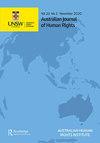自愿“选择加入”——澳大利亚寻求非政府实体遵守人权的方式
Q1 Arts and Humanities
引用次数: 0
摘要
摘要本文探讨了澳大利亚州/地区层面为鼓励非政府实体遵守人权而制定的人权法案中所采用的方法。该条考虑了2004年《人权法》(Act)和2019年《人权法案》(Qld)中的条款,这些条款使非政府组织能够自愿“选择”履行公共当局的法定义务,以遵守人权。这些规定背后的意图是鼓励私营部门实体自愿承担公共当局所期望的人权标准。这篇文章探讨了ACT条款在鼓励私营部门组织“选择加入”方面是如何受到限制的。选择加入的组织主要是非政府、服务导向或倡导组织,这些组织已经对人权做出了坚定的承诺。虽然这可能表明选择加入条款未能成功实现其目标,但在为非政府组织树立遵守人权的榜样方面,它取得了一些适度的成果。在促进和保持政府对发展人权文化的承诺方面,也应该吸取一些重要的教训。本文章由计算机程序翻译,如有差异,请以英文原文为准。
Voluntarily ‘opting-in’ – the Australian approach to seeking human rights compliance from non-government entities
ABSTRACT This article examines the methods employed in the human rights acts that have been legislated at the Australian State/Territory level to encourage compliance with human rights amongst non-government entities. The article considers the provisions in the Human Rights Act 2004 (ACT) and the Human Rights Act 2019 (Qld) that enable non-government organisations to voluntarily ‘opt-in’ to the statutory obligations of a public authority to act in compliance with human rights. The intention behind these provisions was to encourage the voluntary assumption by private sector entities of the human rights standards expected of public authorities. This article examines how the ACT provision has had limited take-up and has not been successful in encouraging ‘opt-in’ by private sector organisations. The organisations that have opted-in are predominantly non-government, service oriented or advocacy organisations that already had a strong commitment to human rights. While this may indicate that the opt-in provision has not been successful in fulfiling its goal, it has achieved some modest outcomes in terms of setting an example for human rights compliance for non-government organisations. There are also some important lessons that should be heeded in terms of promotion and maintaining government commitment to develop a human rights culture.
求助全文
通过发布文献求助,成功后即可免费获取论文全文。
去求助
来源期刊

Australian Journal of Human Rights
Arts and Humanities-History
CiteScore
1.30
自引率
0.00%
发文量
43
期刊介绍:
The Australian Journal of Human Rights (AJHR) is Australia’s first peer reviewed journal devoted exclusively to human rights development in Australia, the Asia-Pacific region and internationally. The journal aims to raise awareness of human rights issues in Australia and the Asia-Pacific region by providing a forum for scholarship and discussion. The AJHR examines legal aspects of human rights, along with associated philosophical, historical, economic and political considerations, across a range of issues, including aboriginal ownership of land, racial discrimination and vilification, human rights in the criminal justice system, children’s rights, homelessness, immigration, asylum and detention, corporate accountability, disability standards and free speech.
 求助内容:
求助内容: 应助结果提醒方式:
应助结果提醒方式:


